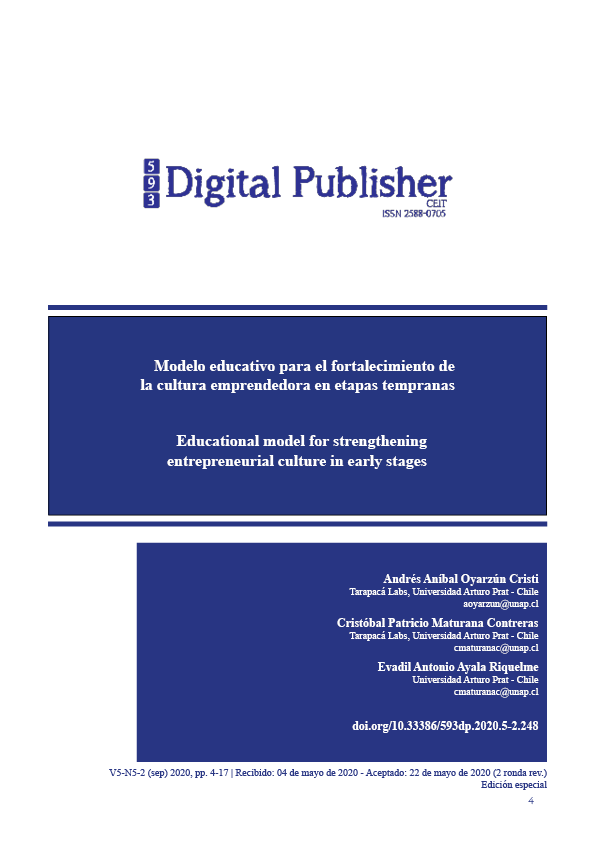Educational model for strengthening entrepreneurial culture in early stages
Main Article Content
Abstract
Entrepreneurial culture is a relevant factor in influencing the competitiveness of a city, region or country. When reviewing the 2019 Global Innovation Index and making a state of the art of experiences in educational entrepreneurship programs in Latin America, the need to generate actions to promote entrepreneurship in early stages is evident. The objective of this study is to design a strategy to teach entrepreneurship in the educational model, which is based on the reality of the Tarapacá region, in northern Chile, and which can be replicated in countries with similar characteristics. The main conclusion lies in the importance of the form and personalization with which the content is delivered, rather than with the theory behind the venture. Based on bibliographic reviews and field analysis in the Tarapacá region, in the north of the trans-Andean country, the importance of working with adolescents is defined and as a result the design of an entrepreneurial training program for students in early stages, from thirteen or fourteen years, where entrepreneurship tools / methodologies are taught and put into practice to promote an entrepreneurial culture.
Downloads
Article Details
1. Derechos de autor
Las obras que se publican en 593 Digital Publisher CEIT están sujetas a los siguientes términos:
1.1. 593 Digital Publisher CEIT, conserva los derechos patrimoniales (copyright) de las obras publicadas, favorece y permite la reutilización de las mismas bajo la licencia Licencia Creative Commons 4.0 de Reconocimiento-NoComercial-CompartirIgual 4.0, por lo cual se pueden copiar, usar, difundir, transmitir y exponer públicamente, siempre que:
1.1.a. Se cite la autoría y fuente original de su publicación (revista, editorial, URL).
1.1.b. No se usen para fines comerciales u onerosos.
1.1.c. Se mencione la existencia y especificaciones de esta licencia de uso.
References
Añazco, S. J. G., & Castillo, T. P. A. (2017). “Competitividad y emprendimiento: herramientas de crecimiento económico de un país”. INNOVA Research Journal, 2(8.1), 322-328.
Barba, D. (2013). “Características emprendedoras personales (CEP): de hombres y mujeres gerentes de las cooperativas de ahorro y crédito de Riobamba: investigación 2010-2011”. Revista Ciencia UNEMI. Nº 9, junio 2013, pp. 62-68. ISSN: 1390-4272.
Baviera Puig, M. A., García García, F., Hervás Oliver, J. L., Loras Campos, J. M., Molina, M., & Palau Ramírez, F. (2019). Evaluación de la competencia transversal CT04 “Innovación, creatividad y emprendimiento” en el Grado en Administración y Dirección de Empresas de la Universitat Politècnica de València. JIDDO. I Jornada de innovación en docencia universitaria para la dirección de organizaciones públicas y privadas, 32-40. Universitat Politècnica de València, 5 de julio 2019.
Cámaras de Comercio - Ministerio de Educación y Ciencia. (2007). “Fomento del espíritu emprendedor en la escuela”. Madrid. Cámaras de comercio - Ministerio de Educación y Ciencia.
Cargua García, A., Posso-Pacheco, R., Cargua García, N., & Rodríguez Torres, A. (2019). La formación del profesorado en el proceso de innovación y cambio educativo. Olimpia, 140-152
Castro Garcés, A. Y., & Martinez Granada, L. (2016). El papel de la investigación acción colaborativa en el desarrollo profesional docente. Profile, 39-54.
Coduras, A., Levie, J., Kelley, D., Saemundsson, R., Schott, T. & Global Entrepeneruship Research Association (GERA) (2010). “Global entrepreneurship monitor special report: Una perspectiva global sobre la educación y formación emprendedora”. Babson College, Universidad del Desarrollo Universidad y de Reykjavik.
Comisión Europea. (2009). “El espíritu empresarial en la educación y la formación profesionales”. Comisión Europea - Dirección general de empresas e Industrias.
Cornell University, INSEAD & WIPO. “Global Innovation Index”. Disponible en: https://www.wipo.int/edocs/pubdocs/en/wipo_pub_gii_2019/cl.pdf (Visitado el 28 de enero de 2020).
Cortés, C., Bravo, U. (2016) “Innova School: utilización de métodos de diseño para crear un nuevo sistema escolar y una experiencia de aprendizaje innovadora en Perú”. Revista Base Diseño e Innovación. Universidad del Desarrollo. Santiago de Chile. ISSN: 0719-515X
Damián, J. (2013). “Sistematizando experiencias sobre educación en emprendimiento en escuelas de nivel primaria”. Revista mexicana de investigación educativa.
FESE. (2011). “Manual educativo para asesores: Mi primera empresa "emprender jugando"”. Ciudad de México: Fundación Educación Superior Empresa - ANUIES.
Fernández, R. T. (2016). Elevator pitch: ¡comunica y defiende tu proyecto en 60 segundos! DIM: Didáctica, Innovación y Multimedia, (34), 1-3. Año 11 - No 34 - 2016 - ISSN: 1699-3748.
García, C. M., Mayor Ruiz, C., & Gallego Noche, B. (2010). Innovación educativa en España desde el punto de vista de sus protagonistas. Profesorado. Revista de currículum y formación del profesorado, 111-134.
Guerrero, M., & Serey, T. (2018). “Reporte nacional de Chile 2018. Global Entrepreneurship Monitor (GEM)”, Universidad del Desarrollo. Santiago de Chile. ISBN: 978-956-374-032-5
Gibb, A. (2005). “Creating the Entrepreneurial University Worldwide Do we need a wholly different model of Entrepreneurship”. Foundation for SME Development.
Hernández, K., González, L., & Herrera, M. (2015). “Emprendimiento universitario: Generalidades y primeros resultados del taller de sensibilización para profesores sobre espíritu emprendedor”. Monterrey: Instituto de emprendimiento Eugenio Garza Lagüera.
Jaramillo, L. (2008). “Emprendimiento: Concepto básico en competencias”. Revista Lumen.
Moreno, M. G. (2000). “Formación de docentes para la innovación educativa”. Revista Electrónica Sinéctica, 24-32.
Olivos, F., Álvarez, I., & Diaz, F. (2013). “Impacto de la educación para el emprendimiento en la creatividad: Una experiencia en Chile con Propensity Score Matching”. Revista Electrónica Educare, 259-276.
Olvera, N., Almeida, C. (2019). El rol del docente en el aprendizaje adaptativo.Revista digital FILHA. Julio-diciembre. Número 21.Publicación bianual.Zacatecas, México: Universidad Autónoma de Zacatecas. ISSN: 2594-0449.
Ortega, M. S., & Ceballos, P. B. (2015). “Design thinking: Lidera el presente. Crea el futuro”. ESIC Editorial. ISBN: 8415986548, 9788415986546.
Romani, G., Didonet, S., Contuliano , S.-H., & Portilla, R. (2013). “Propensity of university students in the Region of Antofagasta, Chile to create enterprise”. Journal of education for business, 253-264.
Salinas, C. R. A. (2014). Aplicación de la metodología CEFE como herramienta para el desarrollo de las capacidades empresariales personales a los estudiantes de la Facultad de Ciencias Empresariales de la UPeU-filial Tarapoto. Valor Agregado, 1(1).
Sepúlveda Parra, C., & Murillo Torrecilla, F. J. (2012). El origen de los procesos de mejora de la escuela. Un estudio cualitativo en 5 escuelas chilenas. Revista Iberoamericana sobre Calidad, Eficacia y Cambio en Educación, 6-24.
Uribe Toril, J., & De Pablo Valenciano, J. (2011). “Revisando el emprendedurismo”. Boletín económico de ICE Nº 3021, 53-62.
Valls, N., Villa, A., Martínez, S., & Hernando, A. (2009). “Emprendimiento social Juvenil. 18 buenas prácticas”. Barcelona: Fundación Bertelsmann.
Vaillant, D., & Marcelo, C. (2015). El ABC y D de la formación docente. Madrid: NARCEA
Vivas Otárola, A. P., & Ángel Arias, C. E. (2018). “Una mirada al emprendimiento en India”. Gestión Ingenio y sociedad, 26-32.
World Economic Forum. “The Global Competitiveness Report”. Disponible en:
http://www3.weforum.org/docs/WEF_TheGlobalCompetitivenessReport2019.pdf (Visitado el 28 de enero de 2020).




